Invisible Language
Invisible Language
Its Incalculable Significance
for Philosophy
Garth L. Hallett
LEXINGTON BOOKS
Lanham Boulder New York Toronto Plymouth, UK
Published by Lexington Books
A wholly owned subsidiary of Rowman & Littlefield
4501 Forbes Boulevard, Suite 200, Lanham, Maryland 20706
www.rowman.com
10 Thornbury Road, Plymouth PL6 7PP, United Kingdom
Copyright 2014 by Lexington Books
All rights reserved. No part of this book may be reproduced in any form or by any electronic or mechanical means, including information storage and retrieval systems, without written permission from the publisher, except by a reviewer who may quote passages in a review.
British Library Cataloguing in Publication Information Available
Library of Congress Cataloging-in-Publication Data
Library of Congress Cataloging-in-Publication Data Available
ISBN 978-0-7391-8286-4 (cloth : alk. paper)
ISBN 978-0-7391-8287-1 (electronic)
 TM The paper used in this publication meets the minimum requirements of American National Standard for Information Sciences Permanence of Paper for Printed Library Materials, ANSI/NISO Z39.48-1992.
TM The paper used in this publication meets the minimum requirements of American National Standard for Information Sciences Permanence of Paper for Printed Library Materials, ANSI/NISO Z39.48-1992.
Printed in the United States of America
Introduction
The invisibility of language, my title suggests, has had incalculable significance for philosophy and its history. Before undertaking to establish this strong claim, let me first explain it. How, to start with, is language here understood and in what sense is language, so understood, invisible?
In one familiar sense of the word, language is written or spoken discourse; in another it is the medium employed. Whereas the discourse can be seen or heard, the medium cannot. In this respect language resembles chess. Thus, as people watching a game of chess see players moving pieces on a board but do not see the rules that govern the moves and define the game, so people hearing or reading the words of a language perceive sounds or marks but do not perceive the rules that govern the signs use and define the language. Similarly, as people do not think of the rules of chess as they themselves play the game but of the moves they make in it, so people do not think of the rules of a familiar language as they write or speak it but of what they say in the language. Even if they did pause to think about the rules, whether of chess or of their linguistic medium, that would not signify doing with the inner eye what they could not do with the outer. The whole calculus would not there be laid out to view, rule by rule, move by permissible move.
Despite these parallels, a typical human language is far less accessible to reflective awareness than is the game of chess. For: (1) Whereas we first learn our mother tongues early in life, more by linguistic interchange than by instruction in the grammar, semantics, and pragmatics of the language, we typically learn chess through explicit instruction, rule by rule, later on. (2) A natural language is incomparably more complex than chess. (Who, for a start, knows all the tens of thousands of words, with all their varied meanings and inflections, listed in a standard dictionary?) (3) From period to period, place to place, dialect to dialect, a language is also far more fluid and flexible than chess, with its relatively rigid, uniform rules. (4) In particular, the cognitive content of terms varies widely from person to person, according to peoples experience, knowledge, and beliefs, and from culture to culture according to prevalent worldviews. (The name Moses, for example, may have very different cognitive contentmay express and convey very different beliefsdepending on whether the speaker or hearer is a critical biblical scholar or a believer in all that scripture recounts.) (5) With regard to this content the impression may readily arise that a language, its speakers shared medium (neither true nor false), is as theoretically committed as are those who make us of it. (6) This impression can, in turn, help to foster linguistic practice in which no distinction between medium and message is in fact discernible. (7) Widespread practice of this kind, for instance and especially in philosophy, further obscures the missed distinction, and an unfortunate circle results: the more the distinction between medium and message is ignored, the less realistic or relevant the distinction may come to appear, and vice versa. Were such practice to prevail still more widely, the distinction would in fact disappear, and with it, not only any linguistic practice comparable with chess, but anything recognizable as human language. Such considerations as these, plus the present works primary focus on written rather than oral discourse, explain the title Invisible Language.
Despite this increasingly bleak account, the phrase invisible language need carry no more negative connotations than does, for instance, talk of invisible particles or invisible waves. Neither should the phrase here often substituted for it, linguistic blindness (focused on the user rather than the medium), be taken to impute any blame. In certain contexts, the words could suggest willful blindness; yet linguistic blindness, like physical, is seldom anybodys choice. The words might also suggest total blindness; yet linguistic blindness, like physical blindness, admits of degrees and, unlike physical blindness, is practically never total in those who still have their wits. Again, the words could suggest constant deprivation, whereas on most occasions the condition described has no untoward effects. Again, the phrase suggests an unnatural condition, whereas linguistic blindness is ever so naturalas natural as our ignorance of the inner workings of our lungs, hearts, and nervous systems. Indeed, the condition the words denote is not only natural, but largely necessary: as we speak or write we cannot constantly monitor the intricate functioning of our linguistic medium, any more than we can continually scrutinize our spectacles or the functioning of our hearts, lungs, or nerves as they do their thing.
Not only are we largely blind to the workings of our languages, but we are largely unaware of our blindness. The invisibility is itself invisible. Thus, concerning the words of our mother tongues it has for instance been said: All of us do meet most of our criteria for understanding those terms, in that we can use them correctly, and correctly paraphrase sentences containing them, correctly explaining them, for example, to children and to non-English speakers. It would be bizarre to say that because we cannot explain them to the satisfaction of an analytic philosopher, our understanding of these words is incomplete. Unreflective mastery must be distinguished from full reflective grasp.
The reason for seeking such reflective clarity in philosophy must be rightly understood, for the parallels I have drawn could be misleading. They could suggest the view, sometimes attributed to Wittgenstein, that, as physical illnesses often signal malfunctioning organs, so philosophical problems typically signal malfunctioning language. However, such was not Wittgensteins view, and neither is it mine. My main concern, like his, is with the invisibility of any languageSpanish, French, or Ugariticand the consequences thereof, not with any putative defects in the language or its employment.
Two further disparities largely explain the present work. First, when our lungs, hearts, nerves, or eyes cause problems, we are typically aware of their malfunctioning and are duly concerned, whereas the more pervasive and profound are the problems that the invisibility of language occasions, the less likely we are to notice them or their gravity. Second, and more reassuring: whereas knowing that ones respiratory, circulatory, nervous, or visual system is faulty does not automatically remedy or improve the condition, awareness of ones linguistic blind spots does remove the blind spots. The great, persistent problem is achieving such awareness; and the fuller, deeper, and more accurate is the assessment of our linguistic blindness and its consequences, the fuller and more effective the remedy is likely to be. This hopeful conviction motivates the present reflection on philosophys history, possibilities, and prospects.
Next page
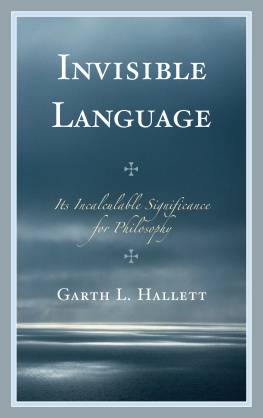

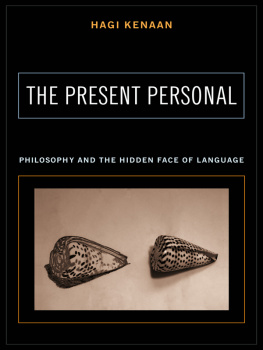
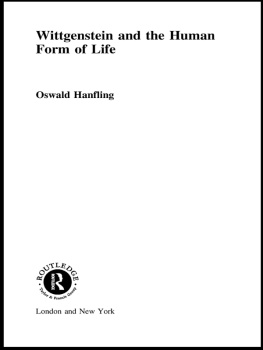
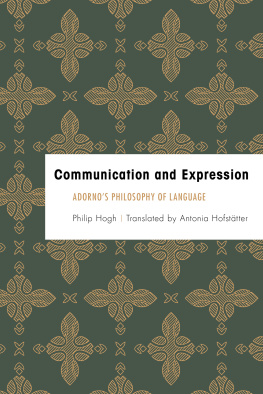
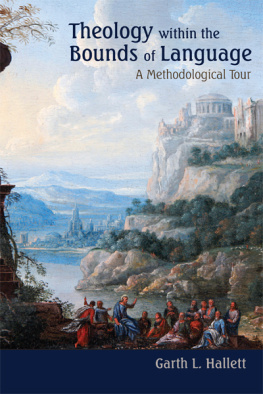

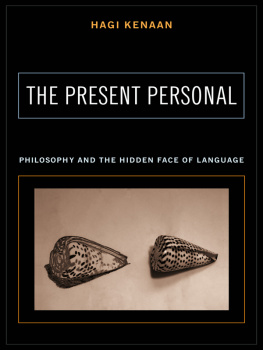
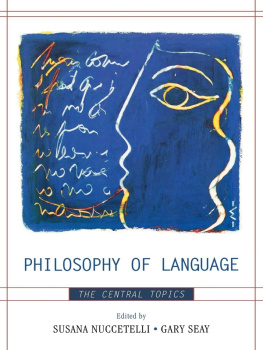
 TM The paper used in this publication meets the minimum requirements of American National Standard for Information Sciences Permanence of Paper for Printed Library Materials, ANSI/NISO Z39.48-1992.
TM The paper used in this publication meets the minimum requirements of American National Standard for Information Sciences Permanence of Paper for Printed Library Materials, ANSI/NISO Z39.48-1992.